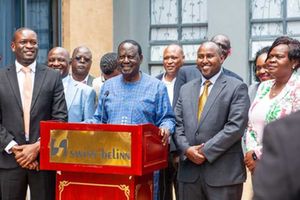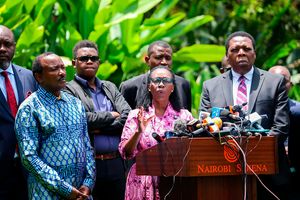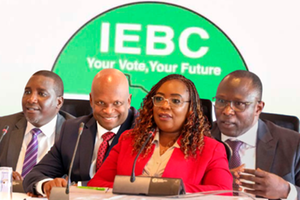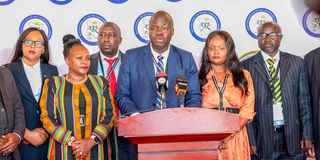
The Selection Panel responsible for the recruitment of nominees for the positions of Chairperson and Members of Independent Electoral and Boundaries Commission led by its chairperson Dr Nelson Makanda addressing the media at the Edge Convention Centre, Nairobi City County on Wednesday, March 26, 2025.
The Independent Electoral and Boundaries Commission (IEBC) selection panel introduced six extra names to the list of shortlisted candidates just days before the start of interviews for the vacant positions of chairperson and members, raising questions on the integrity of the ongoing recruitment.
The six include long-serving provincial administrator Hassan Noor Hassan, Mr Jibril Maalim Mohamed, Mr Michael Ben Oliewo, Mr Charles Kipyegon Mutai, Mr Stephen Kibet Ngeno and Mr Joel Mwita Daniel.
Mr Noor served as the chief administrative secretary for Sports and Education as well as an administrator in the Ministry of Devolution in former President Uhuru Kenyatta’s government. He unsuccessfully contested the Mandera County governorship in the 2022 elections.
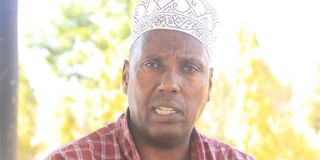
Hassan Noor Hassan.
The six individuals were among the 1,356 applicants for the chairperson and six commissioner positions, as per the list published by the selection panel in the dailies on March 6, but their names did not feature among the shortlisted candidates.
Legal experts argue that the inclusion of the six other names that were not on the shortlist or the addendum violated the IEBC Act, jeopardising the entire process and exposing the outcome to court battles at a time when the country urgently needs the commission in place.
Opposition leaders have already faulted the selection process, terming it opaque and vowing to reject its outcome if their grievances are not addressed.
“The records must show how they included the names before interviews are done,” Makueni Governor and a member of Wiper party Mutula Kilonzo Junior said.
“Given the changed political landscape, where UDA and ODM have formed a government and entered into informal relations, including a memorandum of understanding signed in public on March 7, it is important to clarify who will participate in this critical process of consultation and concurrence,” Wiper party leader Kalonzo Musyoka said last week.
Mr Bob Mkangi, one of the legal experts who wrote the 2010 Constitution, yesterday said inclusion of the six extra names was “questionable”, adding that an addendum published shortly after was strange “and must be explained”.
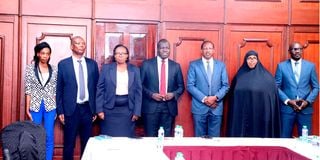
IEBC Selection Panel members (from left) Novince Euralia Atieno, Evans Misati James, Charity Kisotu, Nelson Makanda, Bethuel Sugut, Fatuma Saman and Benson Ngugi Njeri at KICC, Nairobi, on March 6, 2023.
“It is abnormal, irregular, illegal, unethical and above all, unconstitutional,” said Mr Mkangi. “This further jeopardises the integrity and credibility of the exercise.”
New commissioners
His fear is that if the matter is challenged in court the whole recruitment could be scuttled, denying the country new commissioners more than two years since the previous commissioners resigned, were removed or left after completing their terms.
On March 14, the selection panel, chaired by Dr Nelson Makanda, published a shortlist of 11 people for the position of chairperson and 105 people for members of the commission. On the same day, the panel published an addendum of two candidates for the position of chairperson and 26 for members, but did not explain what necessitated the addendum.
On March 25, the team republished the shortlisted candidates for the position of members of the commission, just days before their interviews. The republished list contained the 105 names originally shortlisted, the 26 names in the addendum and the six new names.
When reached for comment, Dr Makanda, in a curt response, referred the Nation to the notice on “republication of shortlisted applicants” on March 25.
The notice read: “Following further reviews of the long list, the selection panel has deemed it necessary to update the shortlist to 111 candidates in order to further enhance compliance with the constitutional principles of regional balance, representation of the youth and overall inclusivity.”
Dr Makanda did not respond to a request for comment on how the additional list of candidates enhanced regional balance and overall inclusivity. With the increased number of interviewees, the selection panel has six candidates to interview per day.
Mr David Ochami, a legal expert, noted that the introduction of names “does not inspire confidence in the entire process”.
“Such conduct by the IEBC selection panel raises doubts about its credibility and the legitimacy of the entire process,” he said.
Interviews
The law states that after conducting interviews, the selection panel shall select two persons qualified to be appointed as chairperson and nine persons qualified to be appointed as members of the commission and forward the names to the President.
The President shall then nominate one person for appointment as chairperson and six persons for appointment as members and “within seven days of receipt of the names, shall forward the list of nominees to the National Assembly for consideration”.
The President shall, within seven days of receipt of the names as approved by the National Assembly, through the Gazette, appoint the chairperson and the six members.
Mr Ochami on Monday said that the entire process can be legally nullified and set aside on the grounds of “bias, arbitrariness and impropriety because all outcomes of such a process do not meet the constitutional standard of transparency and accountability”.
Opaque
“All or any person selected through an opaque and arbitrary manner can have the appointment overturned by a constitutional court because all fruits of a poisonous tree are poisonous,” said Mr Ochami.
The IEBC selection panel was formally appointed by President Ruto on January 27 and took the oath of office on the same day to formally commence its mandate. The law states that the selection panel must complete the recruitment process and forward the names of candidates to the President within 90 days of its appointment and that it “shall thereafter be dissolved”.
However, despite the 90-day period, Parliament can extend the tenure of the selection panel for a specified period by a resolution passed in both the National Assembly and the Senate. Last week, both houses of Parliament passed a resolution to extend the panel’s mandate for a further 14 days.
IEBC commissioners are urgently required to conduct by-elections in some 11 vacant constituency and ward positions. Banissa constituency was left vacant after its former MP Hassan Kullow died in a road accident on March 29, 2023. The Magarini Constituency seat fell vacant after the Supreme Court on May 31, 2024 upheld the nullification of the election of Mr Harrison Kombe.
The appointment of former Ugunja MP Opiyo Wandayi to the Cabinet also necessitated a by-election. Mbeere North MP Geoffrey Ruku has also left a vacancy after he was recently appointed to the Cabinet.


